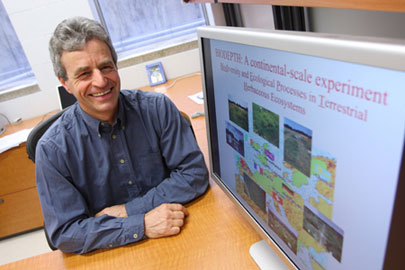Michel Loreau: Putting biodiversity on the front burner
Michel Loreau: Putting biodiversity on the front burner McGill University
User Tools (skip):
Research and development
Michel Loreau: Putting biodiversity on the front burner

Michel Loreau: An ecosystem's best friend
Owen Egan
There is no doubt that climate change is the hot topic where the environment is concerned. But if Michel Loreau has his way, this burning (or warming) issue will soon move over for one he considers even more important to life on Earth: preserving biodiversity.
McGill's Canada Research Chair in theoretical ecology and a world-leader in the field, Loreau is not concerned with a particular endangered species per se, rather, it is with the understanding, protection and enhancement of existing ecosystems for human well-being.
Biodiversity, he explains, is what enables Earth's various ecosystems to provide us with such "ecosystem services" as pollination, the conservation and filtration of fresh water, the protection of coastlines, shorelines and riverbanks from erosion, and the provision of such key raw materials as wood and the active ingredients of some 40 percent of all prescription drugs in North America.
When biodiversity diminishes with the extinction of various species, these free services, found so readily in a healthy ecosystem, stop being free. Loreau points to the example of fruit trees in Nepal that must now be pollinated by humans because bees can no longer survive in the current ecosystem and have either died out or gone elsewhere.
In the last 10 years of his near three decades as an academic, beginning in his native Belgium, Loreau has moved from field biology, where he specialized in ground beetles, to theoretical ecology. Today, his mathematical models are used either to predict the outcomes of various degrees of biodiversity in terrestrial or aquatic ecosystems, or to analyze the responses of experimental ecosystems in which biomass (total plant material) is measured in relation to plant biodiversity.
"It's ironic," he muses, sitting in his renovated office in the Stewart Biology Building, "When, as a young man, I had to decide on what course of study to follow, I was torn between math, physics, biology and philosophy. Now, I'm doing them all."
Loreau believes that complementarity among plant and animal species results in the most productive use of ecosystem resources and will ensure that member species are more resilient to the challenges wrought by climate change. Experimental biodiversity studies, conducted in eight European states, including Ireland, Greece and Sweden, have shown that the greater the native biodiversity in the seeded grassland plot, the greater the yields of grasses. Loreau says that the interactions between the species of plants and between the plants and the various animals and micro-organisms in the earth all work to get the best out of each species.
"In a biodiverse ecosystem, each species exploits different resources," he explains. "Some plants, for instance, will fix nitrogen, a key nutrient to other plant species. In addition, in a biodiverse ecosystem, species are better able to adapt and to defend themselves against disease, invasive species or extreme weather."
The question then becomes, now that we have this knowledge, is it being applied to benefit such staples as corn, wheat and rice—grasses that are usually grown as monocultures involving high inputs of fertilizer, pesticides, herbicides and water? Not widely, Loreau says.
But bridging the gap between the rapidly accumulating evidence proving the necessity of biodiversity for human well-being and those government and United Nations bodies that set policy in such areas as agriculture, fisheries and water management is a priority for Loreau.
In a 2006 issue of Nature, he co-authored an article signed by 19 top biodiversity scientists, arguing that biodiversity research should have the same degree of international coordination and funding as climate change has with the United Nations-funded International Panel on Climate Change. In his capacity as chair of the scientific committee of Diversitas, a Paris-based international program of biodiversity science, Loreau spends roughly a third of his working hours, travelling the world promoting the recognition of biodiversity science.
While he's optimistic that eventually, world leaders will wake up to the crucial role of biodiversity in sustainable economies, he's resigned to the fact that in the short-run, there will be great losses of species. "I do the best I can to raise awareness. Eventually, with enough catastrophes, we will change but many species will be lost. Remember, it took 30 years before politicians paid attention to climate change."
Meanwhile, Loreau makes the most of supporting local biodiversity. Now, enjoying his third Quebec winter, the Hudson resident makes a point of attracting as wide a variety of birds as possible to his feeder. As for the raccoon that has squatted in his chimney, Loreau has ceded to his fellow ecosystem member and condemned the fireplace. "I do have two others," he chuckles.

